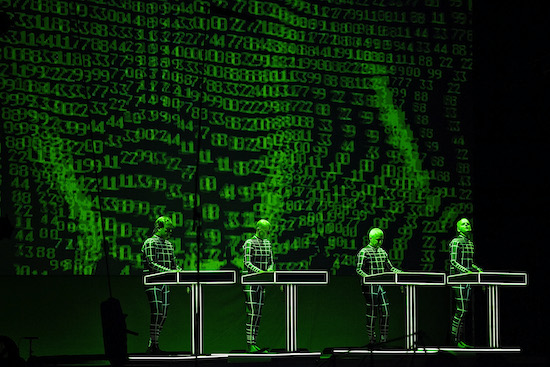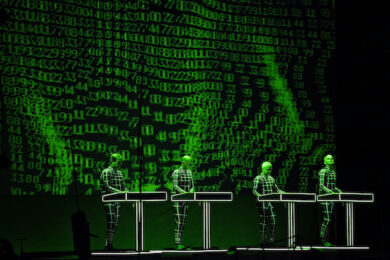According to my library book the Vidzeme Coast, which stretches out north from Riga (capital of Latvia) to the Estonian border, is "largely overlooked by foreign visitors". And Salacgriva is "a busy port with little to offer". Positivus Festival, in its eighth year, would beg to differ. Drowning as it fortuitously is in sunshine, this may be as idyllic a location as exists on God’s earth. Golden light filters through the tall slim pine trees as you wander between stages, and if you happen to walk a few metres astray you find yourself on the kind of pale ochre beach one imagines millionaires buy for themselves, waves lapping gently at your feet like you’re in a Bounty advert. You can lie on that beach and still hear the acts you like. Or if you walk far enough along that beach, you can no longer hear Ellie Goulding. Win win. It’s a beautiful, affable festival – family-friendly though you don’t get shrieking kids in your face – and well-organised (i.e. the decent bands’ onstage times don’t clash). The biggest in the Baltic States, it’s like a prettier Latitude, I’m told, and as marvellously incongruous a place to see Kraftwerk in 3D as anywhere.
Like many unspoiled beaches and enchanted woodlands, it’s miles from anywhere. On the down side, it’s miles from anywhere. This means a daily two-hour drive each way from Riga, where we stay. It’s good to stay in Riga, where the Euro replaced the Lat as recently as January, because who doesn’t want to walk around a city whose architecture is on the UNESCO World Heritage List? But it means an epic journey to the Narnia of Positivus.
On stepping off the plane at Riga we are immediately frog-marched into the van by a stern woman whose day job is working for the President and who categorically refuses to let us shower or drop off our luggage. Thus our first glimpse of the magic forest comes after something like ten sweaty hours in transit, which isn’t ideal for relaxation and/or hedonism. Nonetheless the sights and sunset soon wash off the exhaustion. The Latvian and Estonian people are uniformly absurdly beautiful, their cheekbones and limbs as striking as those of Riga’s Soviet-legacy brutalist sculptures which survived the post-glasnost independence of 1991.
With breaks to watch Latvia’s merry youth balancing fearlessly on twenty-foot-high stacks of crates or dressing in giant plastic bubbles to laughingly bash each other around Sumo-style, you can ease in to the occasion by watching Laura Mvula, in fine voice, woo the mono-cultural crowd. There is grace and class in her talent, but with her one is always waiting for those gifts to coalesce into something bigger, perhaps even one great song. New York electro-rock duo Phantogram keep things simmering, before Future Islands arrive to kick it up a gear. As has been discussed elsewhere, Samuel T. Herring is an extraordinary performer, an unlikely frontman, a force of conviction. Somewhat like Henry Rollins attempting a bad Freddie Mercury impersonation, balding and chubby but committed in his hip-swivelling dance moves, he is the audience’s hero within minutes. The voice, a cracked Roland Gift, begins each synth-pop anthem at a growly guttural level then ascends to sweetness and soul-boy light. "I did a book report on Latvia at high school", he says. "Honestly. So it’s very strange for me to be here for the first time." As he sashays through a climactic ‘Seasons’ and ‘Spirit’ it’s evident he’ll be welcomed back whenever he likes.
Headlining on the main stage are Elbow, trusty stalwarts of indie-Prog. It’s peculiarly frustrating that they are often lumped in with Coldplay and Snow Patrol as bland whitebread-landfill. They’re a thoughtful band who earn their crowd-pleaser anthems with vast passages of lull and introspection, genuine idiosyncrasy and wonderfully literate romanticism. Guy Garvey may play the "Cheers everybody!" regular guy, but in the realm of music there are few people attempting greater degrees of difficulty than he does with words. Scattered among the time-honoured Elbow landmarks are finely-wrought miniatures like ‘Charge’, ‘Fly Boy Fly’ and ‘New York Morning’. ‘My Sad Captains’ rings around the forest, melancholy and moving, before the inevitable finale of "One Day Like This" gives the floating voters what they want. We embark on our road trip back to Riga, finally collapsing into bed after a mere twenty hours on the go.
Refreshed by sleep and now familiarised with the terrain, we are able to enjoy a fascinating Saturday line-up. It’s all building up to Kraftwerk’s whipcracks, of course, but playing through the early evening are Daughter (who, as I observed in Poland a fortnight ago, are worshipped like huge stars in Eastern Europe) and Anna Calvi. Calvi is phenomenal, and it’s galling that she draws half the crowd of Daughter and a tenth of the crowd of subsequent main stage performer Goulding. The voice and guitar brood then lash out with deftly-gauged dynamics and feral ferocity: she is one of our most vital performers, a proud matador, PJ Harvey when she had actual flair rather than critical-consensus acclaim, the electric embodiment of Bowie smearing his lipstick in the Boys Keep Swinging video. Eventually she accepts that this particular show is not lifting off, so amuses herself by throwing in some wild Bolan-Hendrix guitar flourishes. There’s no justice today, but everything about Calvi is righteous.

Everything about Ellie Goulding is (I know it’s not a word) wrongeous. It’s alarming that she draws the biggest crowd of the weekend by a mile, but not as alarming as her phoney I’m-really-into-the-music-maaaan gurning face, her pilfered I’m-a-strong-independent-woman aerobic postures and her risible air- guitar antics. You can’t even dismiss her little-bit-of-everything music as annoying: it doesn’t have sufficient traction. It is a gaping abyss of nothingness, a truly frightening indication of the moribund state of modern pop. What This Says About Us As A Nation I shudder to think, but, worse, other nations are buying it. She might be Satan. But then she’d have some tunes.
Blessed relief is offered over on the second stage, as the Pharaoh Sanders Quartet prove that a 75-year-old jazz-legend saxophonist has more soul and sex in his every breath than that stage-school charlatan. Then King Charles, topless bar for a white cummerbund, does his cod-funk thing to a histrionically appreciative large crowd, before Tricky does his grumpy rock-riffs thing, with rather less joie de vivre, to a much smaller crowd. On another stage, Estonian quartet Junk Riots are a bit of a find, stirring up a highly impressive Franz Ferdinand-Sparks-Comsat Angels swirl with passion and precision.
As we return to the main field, the 3D glasses are handed out and the countdown to Kraftwerk begins. (Half the fun lies in looking around at thousands and thousands of people, some of them in beachwear, sporting those goofy glasses in the open air and nodding in unison to the beat as the sun goes though the last passages of setting. It evokes a 1950s idea of what the future would look like.)
And so, we are the robots. The first 3D-"ooh" of the show comes when the ageless onscreen pixel-based quartet behind the four old men at desk-computers on stage reach their elastic arms out across the first hundred yards of the audience. Everyone is like: I can see it, but I can’t touch it! There are a few other flourishes – planets cruising through the solar system seem to leave the stage and float towards us; trains keep on a-runnin’ off the tracks and into our faces – but the effort and inconvenience of wearing the specs outweighs any gimmicky thrills, and, as in the world of cinema, 3D proves overrated. That subplot aside, Kraftwerk’s film backdrops are sharp and clinically effective. I wouldn’t be the first to point out that the four men up there staring at their synths could be anybody. Or that it wouldn’t matter. The outfit’s ("band" seems the wrong word) influence is famously vast: as much as you recall Giorgio Moroder and The Human League in flashes, there are also spurts which could be Detroit techno or 2 Unlimited. The crowd are enthused at first, to such a degree that you wonder if some of them think this is the other lot, and they’re going to do ‘Get Lucky’. Although as Kraftwerk go past the two-hour mark, rather repetitively (I know that’s the point, but we’re in a field here), those who want to party festival-style drift elsewhere.
Aware that there is an extra dimension to their work in every country they play, they cover their whole career, from Trans-Europe Express to Computer World and ‘The Model’, from The Man-Machine to Tour De France. A lengthy ‘Autobahn’ sounds deliciously sinister if you go and get lost amid the trees by the beach in the dark. Kraftwerk "live" are both historically essential and, eventually, a little bit boring in practice. I agree with every conflicting viewpoint on this. Most admirably, they still make you question every cliché.
Which can’t convincingly be said of Sunday’s line-up: The 1975, Bastille and The Kooks (headlining? really?) are on the main stage. Temples, Of Montreal, Mo and Chet Faker are on the second. Aluna performs without George. It’s a good day for playing truant and exploring Riga, its complex history, striking monuments and Prague-meets-Paris-meets-Berlin charm. In one park, a guy blithely wears a t-shirt saying: Danger – Russian Terrorist. The McDonalds cafes cannot divest the Monument To Freedom or art nouveau district of their majesty.
Some distance away, as Positivus closes, fireworks disturb those taking advantage of the liberally-provided hammocks, and beach parties continue. It’s clear that Salacgriva hosts a well-kept secret that’s on the brink of embracing an increase in international trade. Location, location, location.
<div class="fb-comments" data-href="http://thequietus.com/articles/15849-live-report-positivus-festival” data-width="550">



